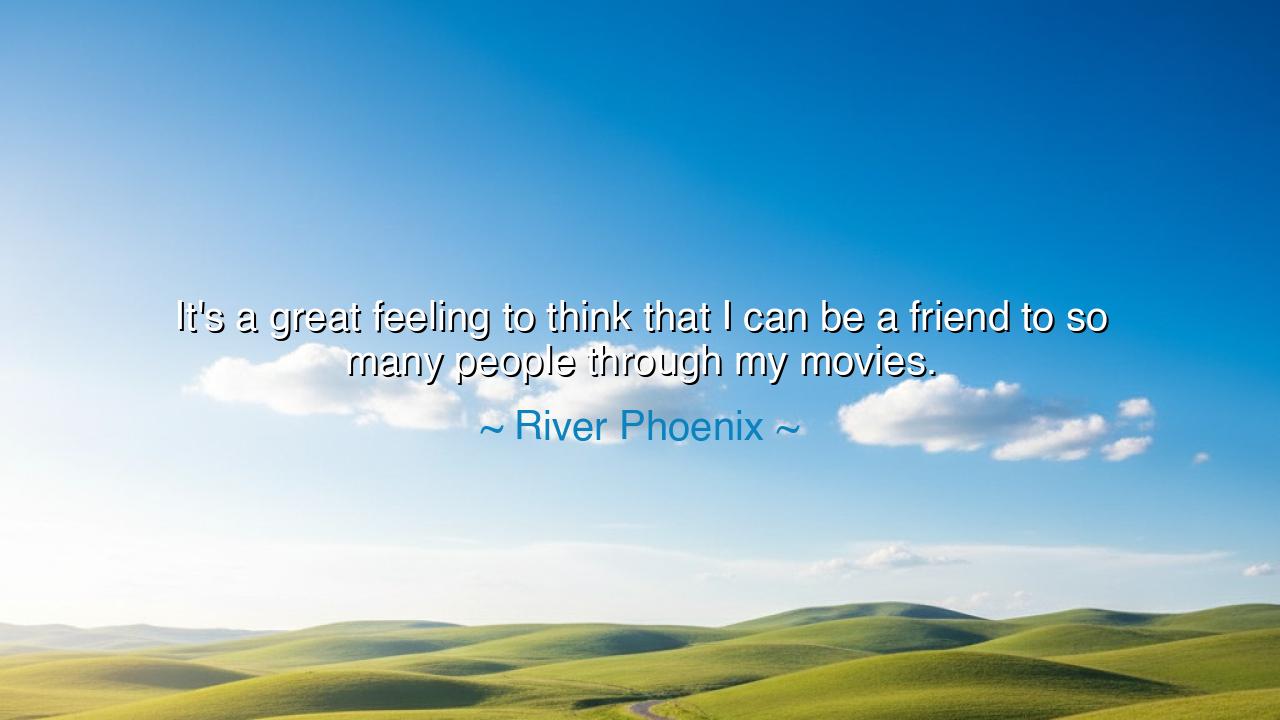
It's a great feeling to think that I can be a friend to so many
It's a great feeling to think that I can be a friend to so many people through my movies.






Hear now, O seekers of wisdom, for in the words of River Phoenix there lies a deep and poignant reflection on the power of art, connection, and the ability of the artist to forge bonds across the vast distances of time and space. He said, "It's a great feeling to think that I can be a friend to so many people through my movies." In this humble declaration, Phoenix reveals a profound truth: that art is not merely an act of creation for the sake of self-expression, but a means of connecting with others, of reaching into their hearts and souls and offering a piece of oneself. Through his movies, Phoenix understood that his work could transcend the confines of the screen, becoming a bridge between his spirit and the spirits of countless others.
In the ancient world, storytelling was not just a pastime or a form of entertainment; it was a sacred duty, a means by which the wisdom of one generation could be passed to the next. Homer, the great poet of ancient Greece, told his epic tales not simply to entertain, but to connect his listeners to the heroes, the gods, and the human struggles that defined their lives. The audience of the Iliad and the Odyssey were not merely passive listeners; they were participants in the great human drama. Through these stories, they were able to recognize their own emotions, desires, and fears reflected back at them. In the same way, Phoenix saw his films as a means of connecting with others—a means of becoming a friend to those who encountered his work, of offering a piece of his humanity to all who watched.
Consider the example of Socrates, whose words and teachings were not just for the philosophers of his time but for all those who sought to understand the world and their place within it. Socrates did not seek wealth or fame but wished to connect with others through his questions and dialogues. Through his conversations, he invited others into a shared pursuit of wisdom, creating a community of thought that transcended his own life. Phoenix’s reflection on the power of his films is akin to Socrates’ vision of philosophical connection. For Phoenix, his movies became not just personal achievements, but ways in which he could reach across boundaries—cultural, geographical, and personal—to build a connection with others, to be a friend in the most meaningful sense.
Consider also the great storytellers of old, like Shakespeare, whose works have transcended time. Shakespeare's plays, such as Hamlet and Macbeth, spoke to the deepest aspects of human nature—ambition, guilt, love, and betrayal. His characters were not just figments of imagination; they were reflections of the human soul, resonating with audiences from his time to the present day. Through his words, Shakespeare connected with generations of people, becoming, in a sense, a friend to countless souls, guiding them through the complexities of life. Phoenix’s desire to be a friend through his films mirrors this ancient tradition of artists using their craft not just for their own benefit but to build relationships with their audiences, to offer understanding, solace, and kinship.
The story of Vincent van Gogh provides another illuminating example. Though he lived in relative isolation, van Gogh’s paintings were his way of connecting with the world around him, of sharing his vision, his suffering, and his beauty. In his work, van Gogh sought to bridge the distance between himself and others, to offer them a glimpse into his soul. His art spoke to a shared humanity, touching those who came after him in ways he never could have imagined. Like van Gogh, Phoenix used his craft—through film—to connect with others, to offer something meaningful, to be a friend to those who needed it most, even if they never met him in person.
The lesson to be drawn from Phoenix’s words is clear: True greatness in art lies not in the accolades or fame one accumulates, but in the connections one makes with others. Art has the power to transcend time and space, to reach into the hearts of people from all walks of life, to offer comfort, understanding, and fellowship. Phoenix’s films, like the works of the great philosophers, poets, and artists before him, were not just pieces of entertainment—they were bridges, offering friendship and understanding across the vast distances that separate us.
So, young ones, heed this truth: As you pursue your own crafts and passions, remember that the true measure of your work lies not in the accolades it brings, but in the connections it fosters. Create with the intention of reaching out to others, of becoming a friend to those who need it. In your words, in your art, in your actions, seek to build relationships, to foster empathy, and to bring others closer to the humanity that binds us all. For in this, you will find that the power of art lies not only in its creation but in its ability to speak to the hearts of others, offering them a piece of comfort, understanding, and connection. In this, you will find the true meaning of art—to be a friend, not just to yourself, but to the world.






AAdministratorAdministrator
Welcome, honored guests. Please leave a comment, we will respond soon